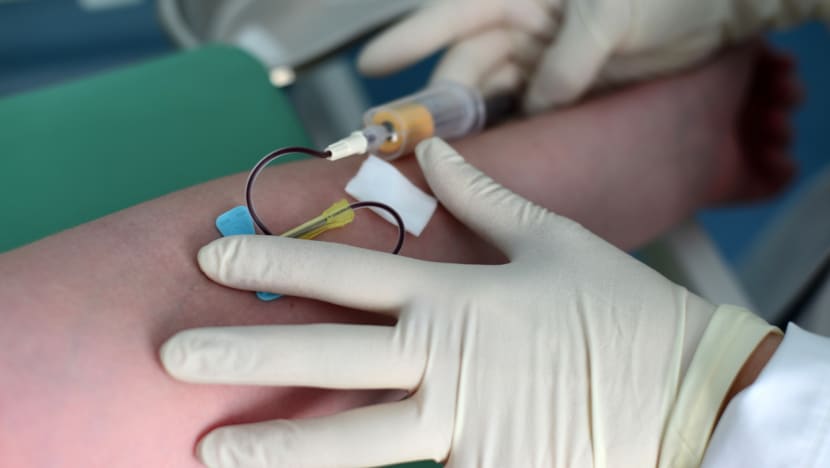Acute hepatitis in 10-month-old in Singapore: What should you look out for?

File photo of blood sample from a vein in a child. (Photo: iStock)
SINGAPORE: Last week, a 10-month-old boy in Singapore was found to have acute hepatitis with unknown cause.
The Ministry of Health (MOH) informed the public about the case in a statement on Apr 30, a day after it was notified.
The ministry said then that investigations were ongoing to determine if the case was similar to those in a recent global outbreak.
Globally, more than 200 suspected and probable cases of acute hepatitis of unknown cause have been reported in children across 17 countries, MOH said.
It added that it was monitoring the situation closely and had informed all medical practitioners to be vigilant to young children presenting with signs and symptoms of hepatitis for which a cause cannot be identified.
"Investigations are ongoing to determine if the case has a similar presentation to the cases of acute hepatitis of unknown cause reported internationally and by the World Health Organization," said MOH.
CNA spoke to experts to find out whether parents should be worried and what symptoms to look out for.
HOW WORRIED SHOULD PARENTS BE?
Parents and guardians should not be alarmed, said Dr Chiou Fang Kuan, head of the gastroenterology, hepatology and nutrition service at KK Women’s and Children’s Hospital (KKH).
“Rather, they should be alert to signs of hepatitis and seek medical attention if concerned,” he said.
Dr Nancy Tan from SBCC Baby and Child Clinic at Mount Elizabeth Novena said that parents should be aware and know about what to watch for, but need not be “overly worried” as the number of cases is not high.
However, given that there have been four deaths - including three reported in Indonesia - in the global outbreak and 17 cases needed transplants, the cases are “of concern”, said Dr Ang Ai Tin, consultant paediatrician at Thomson Paediatric Centre.
WHAT ARE SOME COMMON SYMPTOMS?
Symptoms are non-specific and can include abdominal pain, diarrhoea and vomiting said Dr Tan, who is trained in paediatric gastroenterology, hepatology and nutrition.
“However, the most important sign would be that of jaundice (yellowing of the whites of the eyes),” she said.
Other symptoms of hepatitis include dark urine, pale, grey-coloured faeces, itchy skin and muscle or joint pain, the doctors said.
Dr Chan Si Min, head of the paediatric infectious diseases department at Khoo Teck Puat-National University Children’s Medical Institute noted that the cases of acute hepatitis currently under investigation mainly affect young healthy children below 10 years old.
WHAT ARE THE POSSIBLE CAUSES?
Dr Ang said that the virus detected and suspected in the worldwide cases that Singapore’s case may be linked to is adenovirus type 41F.
"Adenovirus usually does not cause hepatitis in children but in such affected children, there may be a cofactor, such as a toxin or previous viral infection," she said.
Dr Chan also noted that adenovirus was found in many of the reported cases.
"This is a virus with many genetic variants and types. Infection occurs at any age, although mainly in young children, and at any time of the year," she said.
It usually causes fever, respiratory illness like cough, cold, sore throat, gastroenteritis, she said. She added that adenovirus is spread by respiratory droplets or secretions, or direct contact with an infected person, stool or contaminated surface.
"It can last on environmental surfaces for a long time. Infected people are most infectious in the first few days of illness," she said.
Infections, autoimmune disease, metabolic disorder, drug- or toxin-induced liver injury are some of the possible known causes, said Dr Chiou.
"However, in up to 40 per cent of cases of severe hepatitis, no cause is found despite extensive investigations," he said.
"As children remain vulnerable to childhood infectious diseases, parents should still remain vigilant, even as pandemic-response initiatives in Singapore are reduced."
He added that the standard good hygiene recommendations which include good and careful hand hygiene, cleaning and disinfestation of surfaces in settings attended by young children, should always be practised.
DOES VACCINATION OFFER PROTECTION?
The cause of the global cases of acute hepatitis remains unknown at this stage, so it is too early to be certain if routine vaccinations under the national immunisation schedule protect against this type of hepatitis, said Dr Chiou.
Routine childhood vaccines do not protect against acute hepatitis because hepatitis A and B in the vaccination schedule protect against the A and B viruses specifically, said Dr Ang.
WHAT TO DO IF A CHILD IS UNWELL?
See a doctor if a child is unwell, said Dr Tan.
"The presentation of hepatitis may not be obvious (early on), so it is always advisable to return to the doctors if they are not better 48 to 72 hours after consultation - or earlier if they deteriorate," she added.
A blood test may be done to look for liver inflammation, and samples can be sent to detect the presence of adenovirus and other infections, Dr Chan said.
Treatment is mostly supportive. It is focused mainly on monitoring and treatment of complications of liver disease, and investigation and management of the underlying cause where applicable, said Dr Chiou.
In a small proportion of patients, acute hepatitis can lead to severe and sudden liver failure which may require an organ transplant, he added.














